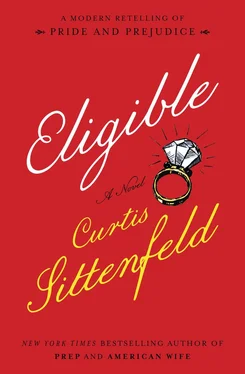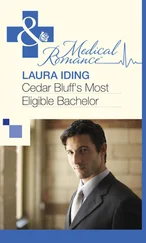“With a world-class ego, apparently. Just to warn you, Mom’s downstairs practically salivating. She knows you were out late.”
“You didn’t tell her how late, did you?”
“No, but I can’t promise she wasn’t looking out the window when Chip dropped you off.”
“It’s funny, isn’t it?” Jane said. “Because think how much trouble I’d have gotten in back in high school for coming home from a date at five in the morning. But I just had to wait twenty years, and now Mom’s probably thrilled.”
“I’VE GOT A question that you need not repeat to any of your sisters,” Mr. Bennet said. He and Liz sat in an exam room at the orthopedist’s office, waiting for the removal of the cast on his arm, a duty Jane had told Liz she didn’t think she could sit through. “I’m afraid I’ll throw up,” Jane had said, and Liz had said, “Because of the saw?” Jane had shook her head and said, “Because of the smell.”
“This business about Mary being homosexual,” Mr. Bennet continued. “Do you think there’s anything to it?”
Surprised, Liz said, “Why?”
“Your mother wouldn’t like it, of course. But what’s the old saying about people going about their business as long as they don’t do it in the street and frighten the horses?”
“Wow, Dad,” Liz said. “Have you become a Democrat?”
Her father shuddered. “Scarcely. But where does Mary go on Tuesday nights?”
“You could ask her. Where she goes, I mean, not if she’s gay. Well, you could ask her that, too, although I don’t know if I would.” Liz had concluded some years earlier that Mary wasn’t interesting enough to be gay. All the gay people Liz knew in New York, both men and women, were a little more something than average — a little more thoughtful or stylish or funny — though perhaps, Liz reflected, it was New York itself rather than gayness that accounted for their extra appeal.
“If Mary has a friend she doesn’t think she can bring to dinner, that’d be rather a shame,” Mr. Bennet said. “Her significant other deserves to suffer as much as the rest of us.” He was looking at Liz directly, and she tried not to squirm. Was he talking about Mary, or was he actually alluding to her and Jasper?
“She must have her reasons,” Liz said. “You did just say yourself that Mom would be horrified.”
“Your mother is horrified many times a day.”
“At least now Mom has Chip Bingley to pin her hopes on. Did you know he and Jane went out for the second time last night? They went to a movie.”
Before Mr. Bennet could answer, the door opened, and there appeared a male nurse in aqua-colored scrubs, carrying the plastic saw with its round blade at one end; the entire contraption wasn’t much larger than an electric toothbrush. “Fred!” the nurse said, though they had never met. “How are we today?”
Reading the nurse’s name tag, Mr. Bennet replied with fake enthusiasm, “Bernard! We’re mourning the death of manners and the rise of overly familiar discourse. How are you?”
“REMEMBER ALLEN BAUSCH?” Mrs. Bennet said as Liz sat by herself at the kitchen table eating lunch.
Liz looked at her mother with curiosity. “Mary’s prom date?”
“You should find him on the computer and send him a message from Mary. That’s something that happens a lot now. Couples find each other on their computer after losing touch, and then they get married.”
“He’s probably married to someone else.”
“He isn’t. His aunt is in the Women’s League.”
“Either way, why would I reach out to him? Shouldn’t Mary do it?”
“She can be so stubborn.”
“Were Mary and Allen even a couple? They might have just gone to prom as friends.”
“He’s a lawyer in Atlanta, and he’s very active in his church,” Mrs. Bennet said. “If that’s not the description of a man looking for a wife, I don’t know what is.”
CHARLOTTE LUCAS CALLED Liz midweek. “I’m organizing a game night for Friday,” she said. “Can you come, and can you tell your sisters?”
“Do you remember that Lydia cheats?”
“Is it possible to cheat at Charades?”
“Oh, she’ll find a way,” Liz said. “I think Jane’s going out with Chip again Friday — for the third time, if you can believe it. But I’m definitely in, and I’ll try to round up Mary or Kitty.”
“Jane should bring Chip. Or should I invite him myself?”
Liz hesitated. On the one hand, the chance to observe her sister and Chip together was tempting. On the other hand, if Chip attended game night — and Liz nerdily, unabashedly adored game nights — he might bring his sister or, worse, Fitzwilliam Darcy. But who was she to exclude others? “Sure,” she said to Charlotte. “Call Chip.”
SO DEPRESSING AND uncomfortable had Liz found the update about Mervetta that in searching for new housecleaners, she sought agencies that would send rotating crews of three rather than an individual, with whom Mrs. Bennet might have a falling-out.
With estimates in hand for both cleaning and yard services, Liz knocked on the door of her father’s study. When he called, “There’s no one home,” she pushed the door open.
Mr. Bennet’s desk, which he sat behind, faced into the room, so that Liz saw the back rather than the front of his computer. Aside from this computer, her father’s study looked as it had when his parents had sold the house to him in 1982 for the sum of one dollar, the same year they sold their summer home in Petoskey, Michigan, to his sister, Margo, for the same price. Indeed, it was quite possible that Mr. Bennet’s study, with its sleigh bed, brown velvet curtains, leather-topped writing desk (the leather was burnt red and had a border of gold-leaf embossing), and porcelain desk lamp with fringed shade, was unchanged since Liz’s grandparents had first moved into the Tudor in 1927.
In her youth, Liz had understood her father to be an important businessman, an investor — he had driven each morning to a two-room office on Hyde Park Square, where he’d employed a secretary named Mrs. Lupshaw — and it was only with the passage of time that Liz realized that the investments he oversaw were solely those belonging to his immediate family and that, further, their oversight accounted for the entirety of his job. This realization had been so gradual that it was not until her junior year of college, when a friend of Liz’s said of the wealthy older guy the friend was dating, “He pretends to work, but I think he’s one of those men who push around piles of his family’s money,” that Liz felt an unwelcome sense of recognition. A decade earlier, when her father had “retired,” Liz had wished she did not have the cruel thought From what?
Liz entered the study. “I’ve found people to clean up the house and the yard,” she said. She glanced at the reporter’s notebook in her hand. “I’m thinking I’ll have them both come every two weeks, though obviously you’ll need the yard people less after the summer. When Mrs. Bildeier dropped off banana bread, she gave me the name of the cleaning service she uses, and she said they’re great.”
Her father’s eyes were focused on the computer screen as he said, “Your mother cleans the house, and I mow the lawn.”
“In theory, maybe. But you still don’t have full mobility, and Mom is so focused on her Women’s League luncheon.” Following the removal of his cast the day before, Mr. Bennet’s right arm was pale, shrunken, scabby, and, even after a shower, not entirely free of the rotten odor Jane had predicted; when Liz had asked Dr. Facciano how long it would be before her father could drive, the doctor had said four to six weeks.
Читать дальше
Конец ознакомительного отрывка
Купить книгу












